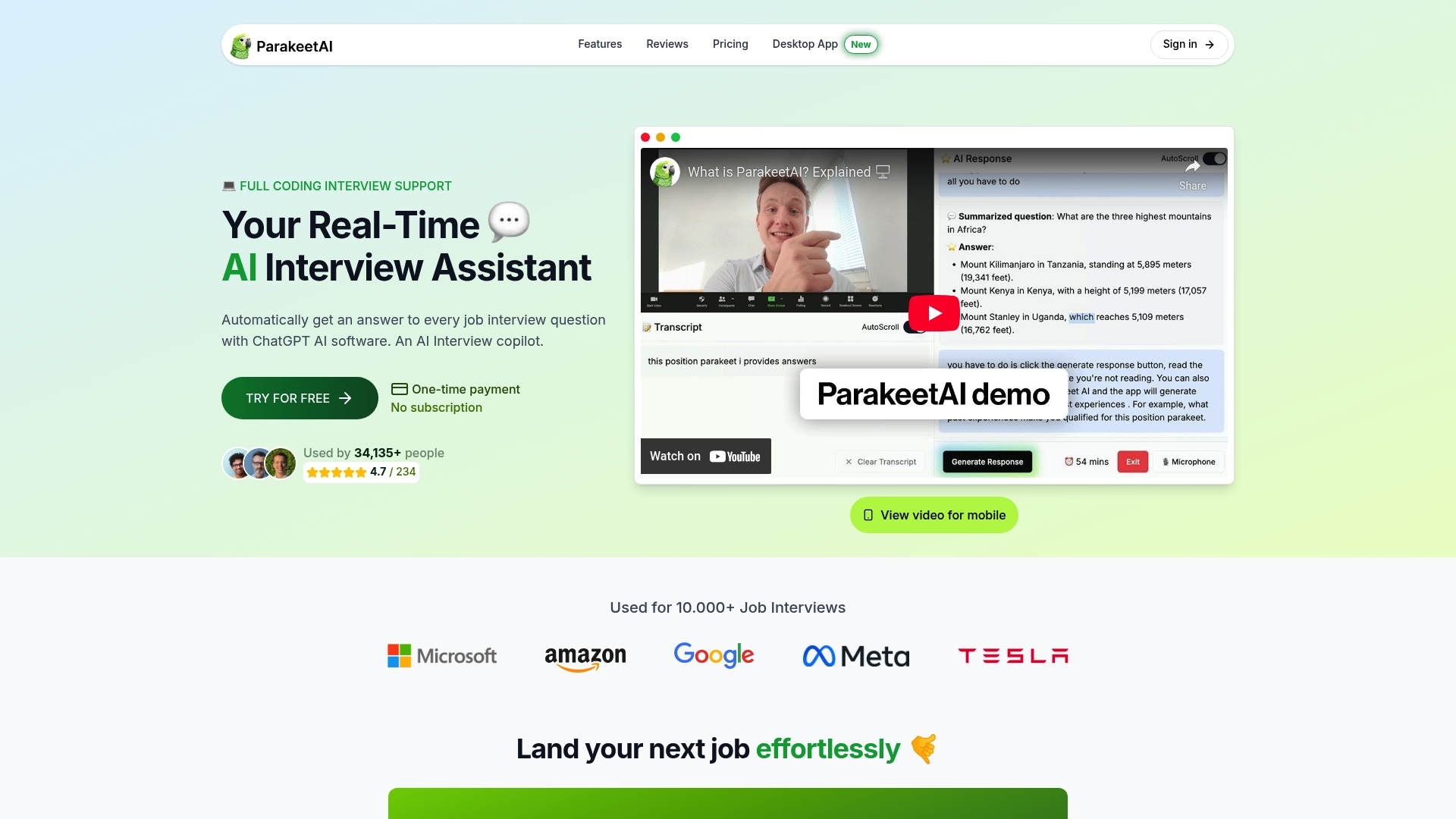Understanding the Role of AI Chatbots in Interviews

Companies are now relying on AI chatbots to shape first impressions when candidates apply for jobs. Hiring managers can let these bots handle thousands of screenings at once and still get detailed reports right away. Most people think robots in interviews would make things impersonal or robotic, but that is not how it works. The biggest surprise is that AI chatbots can actually conduct interviews in multiple languages and adapt their tone in real time, creating a more personal and comfortable process than many human-led interviews ever offered.
Table of Contents
- What Are AI Chatbots And Their Functions In Interviews?
- Why AI Chatbots Matter In The Interview Process
- How AI Chatbots Enhance Candidate Experience And Efficiency
- Key Concepts Of AI Chatbots Used In Interviews
- Real-World Applications And Future Of AI Chatbots In Interviews
Quick Summary
| Takeaway | Explanation |
|---|---|
| AI chatbots enhance candidate engagement | These systems create personalized interactions, making candidates feel valued and understood throughout the interview process. |
| Standardized assessments reduce bias | AI chatbots provide consistent evaluations, mitigating human biases in hiring decisions. |
| Efficient recruitment automates processes | Chatbots streamline initial screenings, allowing organizations to handle large volumes of candidates effectively and quickly. |
| Advanced technologies improve interactions | Machine learning and natural language processing make chatbots capable of understanding nuanced candidate responses and providing intelligent feedback. |
| Global accessibility supports diverse talent | Candidates can interview in their preferred language and from anywhere, ensuring diverse hiring without logistical limitations. |
What are AI Chatbots and Their Functions in Interviews?
AI chatbots are advanced computer programs designed to simulate human conversation through text or voice interactions. In the context of job interviews, these intelligent systems leverage natural language processing and machine learning technologies to engage with candidates, assess responses, and provide dynamic interview experiences.
Understanding AI Chatbot Capabilities
AI chatbots in interviews are not mere scripted response generators. They represent sophisticated technological tools capable of understanding context, interpreting nuanced communication, and providing intelligent feedback. Research from Carnegie Mellon University demonstrates that these chatbots can significantly enhance candidate engagement by creating interactive and personalized interview experiences.
Key capabilities of AI interview chatbots include:
- Conducting initial screening interviews
- Analyzing candidate communication skills
- Providing immediate, objective candidate assessments
- Supporting multilingual interview interactions
- Reducing human interviewer bias
Technical Foundations of Interview Chatbots
At their core, interview chatbots utilize advanced algorithms that combine several technological approaches. Natural language processing enables them to comprehend candidate responses, while machine learning allows continuous improvement in understanding communication patterns. Artificial intelligence empowers these systems to learn from each interaction, making them progressively more sophisticated in evaluating candidate potential.
These AI systems can process verbal and written communication, detecting subtle nuances in language, tone, and response structure. By integrating psychological assessment frameworks, chatbots can provide comprehensive insights into a candidate’s communication style, problem-solving approach, and potential cultural fit within an organization.
The role of AI chatbots in interviews represents a significant technological advancement in recruitment processes, offering organizations scalable, efficient, and data-driven candidate evaluation methods.
Why AI Chatbots Matter in the Interview Process
The integration of AI chatbots in the interview process represents a transformative approach to talent acquisition, addressing critical challenges faced by modern organizations in recruiting and evaluating candidates. These intelligent systems are not merely technological novelties but strategic tools that fundamentally reshape how companies approach talent selection.
Addressing Traditional Interview Limitations
Traditional interview methods are inherently subjective and prone to human biases. Hiring managers often make decisions based on unconscious prejudices, limited interaction time, and inconsistent evaluation criteria. Research from Stanford University reveals that AI chatbots can systematically mitigate these limitations by providing standardized, data-driven candidate assessments.
Key advantages of AI chatbot interviews include:
- Consistent evaluation across all candidates
- Elimination of human emotional biases
- Faster screening and initial candidate assessment
- Comprehensive performance documentation
- Objective scoring mechanisms

Enhancing Recruitment Efficiency
AI chatbots dramatically transform recruitment workflows by automating initial screening processes. Organizations can now conduct high-volume interviews without compromising quality or investing significant human resources. These intelligent systems can simultaneously interact with multiple candidates, analyze their responses in real-time, and generate detailed performance reports.
Moreover, AI chatbots enable companies to extend their recruitment reach beyond traditional constraints. They can conduct interviews in multiple languages, operate across different time zones, and provide candidates with flexible interview scheduling. This global accessibility ensures that organizations can tap into diverse talent pools without logistical limitations.
By leveraging advanced natural language processing and machine learning algorithms, AI chatbots represent more than a technological innovation.
The following table compares traditional interview methods with AI chatbot interviews, highlighting the ways in which AI chatbots address key limitations in the hiring process.
| Aspect | Traditional Interviews | AI Chatbot Interviews |
|---|---|---|
| Evaluation Consistency | Varies by interviewer | Standardized across all candidates |
| Bias | Prone to human bias | Minimizes bias with objective assessments |
| Screening Speed | Time-consuming, manual | Immediate, automated screening |
| Documentation | Inconsistent, manual notes | Automated, comprehensive records |
| Language Accessibility | Limited to interviewer capabilities | Supports multiple languages |
| Candidate Comfort | Can be intimidating | Reduces anxiety, more comfortable |
| Scalability | Limited by human bandwidth | Handles thousands of candidates at once |
How AI Chatbots Enhance Candidate Experience and Efficiency
AI chatbots are revolutionizing the candidate experience by creating more responsive, personalized, and engaging interview interactions. These intelligent systems go beyond traditional recruitment methods, offering candidates a streamlined and technologically advanced approach to job application processes.
Personalized Candidate Engagement
Personalization stands at the core of AI chatbot interactions. These systems can adapt their communication style, provide real-time feedback, and create tailored interview experiences that make candidates feel valued and understood. Research from MIT indicates that candidates are more likely to engage positively with virtual interviewers that demonstrate serious and assertive communication styles.
Key aspects of personalized candidate engagement include:
- Customized interview question sequences
- Adaptive communication tone
- Immediate response mechanisms
- Contextual feedback generation
- Reduced waiting times between interaction stages
Improving Interview Accessibility and Comfort
AI chatbots democratize the interview process by removing geographical, temporal, and linguistic barriers. Candidates can now participate in interviews from anywhere, at any time, using their preferred language. This accessibility ensures that talented individuals are not disadvantaged by traditional interview limitations.
Moreover, AI chatbots help reduce candidate anxiety by providing a less intimidating interview environment. Unlike human interviewers, these systems offer a consistent, non-judgmental interaction that allows candidates to express themselves more freely. They can practice responses, receive instant feedback, and gain confidence throughout the interview process.

By integrating advanced natural language processing and machine learning technologies, AI chatbots are transforming recruitment from a transactional experience into a supportive, candidate-centric journey that prioritizes individual potential and organizational efficiency.
This table summarizes the core capabilities of AI chatbots used in interviews alongside key technologies that enable each function.
| AI Chatbot Capability | Enabling Technology | Benefit in Interviews |
|---|---|---|
| Multilingual Communication | Natural Language Processing | Broadens global talent pool |
| Adaptive Tone and Feedback | Machine Learning | Personalizes candidate experience |
| Objective Candidate Assessment | AI Algorithms | Standardizes evaluation, reduces bias |
| Real-Time Response Analysis | NLP and Machine Learning | Enables instant, dynamic feedback |
| Communication Skills Evaluation | NLP, Semantic Analysis | Provides deeper insight into candidates |
| Immediate Reporting | Automated Data Processing | Accelerates decision-making |
Key Concepts of AI Chatbots Used in Interviews
AI chatbots for interviews represent complex technological systems that integrate multiple advanced computational techniques to simulate intelligent human-like interactions. Understanding their core functional mechanisms provides insights into how these sophisticated tools transform recruitment processes.
Natural Language Processing Architecture
Natural Language Processing (NLP) serves as the foundational technology enabling AI chatbots to comprehend, interpret, and generate human-like responses. Research from the National Institutes of Health highlights the intricate mechanisms through which these systems translate unstructured human communication into structured, analyzable data.
Key components of NLP in interview chatbots include:
- Semantic understanding of candidate responses
- Contextual interpretation of language nuances
- Grammatical structure analysis
- Intent recognition and classification
- Sentiment and emotional tone detection
Machine Learning and Adaptive Intelligence
Machine learning algorithms empower AI chatbots to continuously improve their performance through iterative learning. These systems analyze thousands of interview interactions, extracting patterns and refining their response strategies. By processing vast amounts of conversational data, chatbots develop increasingly sophisticated communication capabilities.
The adaptive intelligence of AI chatbots allows them to:
- Recognize communication patterns
- Adjust interview strategies based on candidate responses
- Generate progressively more accurate candidate assessments
- Learn from previous interaction outcomes
- Minimize repetitive questioning
By integrating advanced computational techniques, AI chatbots transform traditional interview processes into intelligent, dynamic interactions that provide comprehensive candidate evaluation while maintaining a human-like engagement experience.
Real-World Applications and Future of AI Chatbots in Interviews
AI chatbots are rapidly transitioning from experimental technologies to practical recruitment tools, reshaping how organizations approach talent acquisition and candidate evaluation. Their applications extend far beyond simple screening processes, offering sophisticated solutions to complex hiring challenges.
Current Industry Implementations
Organizations across multiple sectors are integrating AI chatbots into their recruitment workflows, transforming traditional hiring methodologies. Research from the International Journal of Engineering reveals that these intelligent systems are being deployed in diverse professional environments, from technology firms to healthcare institutions.
Current industry applications include:
- Initial candidate screening
- Technical skill assessment
- Preliminary interview scheduling
- Candidate communication management
- Performance potential evaluation
Emerging Technological Frontiers
The future of AI chatbots in interviews promises even more advanced capabilities. These systems are evolving to provide more nuanced, contextually aware interactions that go beyond simple question-answer exchanges. Machine learning algorithms are enabling chatbots to understand emotional intelligence, detect communication subtleties, and generate more human-like responses.
Emerging technological developments suggest that AI chatbots will soon:
- Integrate advanced psychological assessment techniques
- Provide real-time skill development recommendations
- Offer personalized interview preparation strategies
- Support multilingual and cross-cultural communication
- Generate comprehensive candidate potential reports
As artificial intelligence continues to advance, AI chatbots are poised to become integral components of modern recruitment strategies, offering unprecedented insights into candidate capabilities while streamlining hiring processes for organizations worldwide.
Upgrade Your Interview Experience With Real AI Assistance
Most companies struggle with biased, inconsistent interviews and candidates often walk away feeling overlooked. The article highlights how advanced AI interview chatbots solve these challenges with real-time feedback, smarter interactions, and unbiased candidate evaluation. Imagine turning these proven benefits into your competitive edge.

Now you can experience this breakthrough for yourself. Parakeet AI is a real-time AI job interview assistant that listens to your interviews and instantly gives you smart, tailored responses. Stop letting great opportunities slip through the cracks due to outdated interview methods. Discover how you can bring intelligent decision-making and confidence to your next interview by visiting our website and exploring the future of hiring intelligence. Take control of your outcomes today with Parakeet AI.
Frequently Asked Questions
What are AI chatbots and how do they function in interviews?
AI chatbots are advanced programs designed to simulate human conversation through text or voice interactions during job interviews. They leverage natural language processing and machine learning to engage with candidates and assess their responses dynamically.
How do AI chatbots enhance the candidate experience during interviews?
AI chatbots create a personalized and engaging interview experience by adapting their communication style, providing immediate feedback, and allowing flexible interview scheduling, which helps reduce candidate anxiety.
What are the main advantages of using AI chatbots in the interview process?
The main advantages include consistent evaluations across all candidates, elimination of human biases, faster screening, comprehensive documentation of performance, and the ability to interact in multiple languages.
How do AI chatbots improve recruitment efficiency for organizations?
AI chatbots automate initial screening processes, allowing organizations to conduct high-volume interviews without compromising quality. They can analyze responses in real-time, generate performance reports, and reach diverse talent pools effectively.




